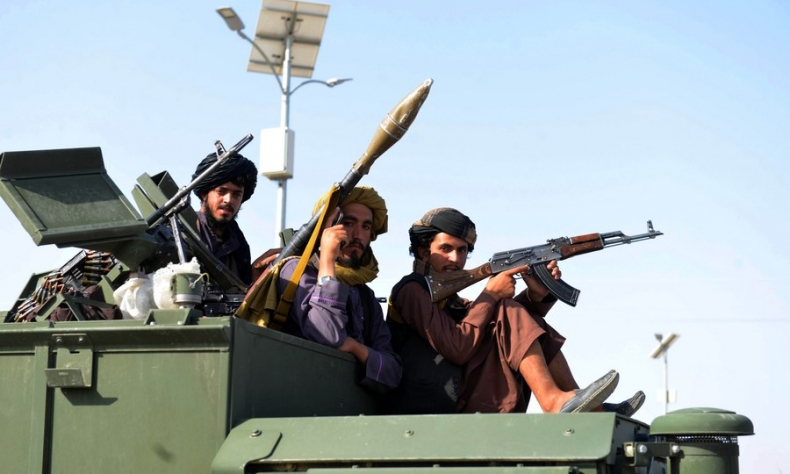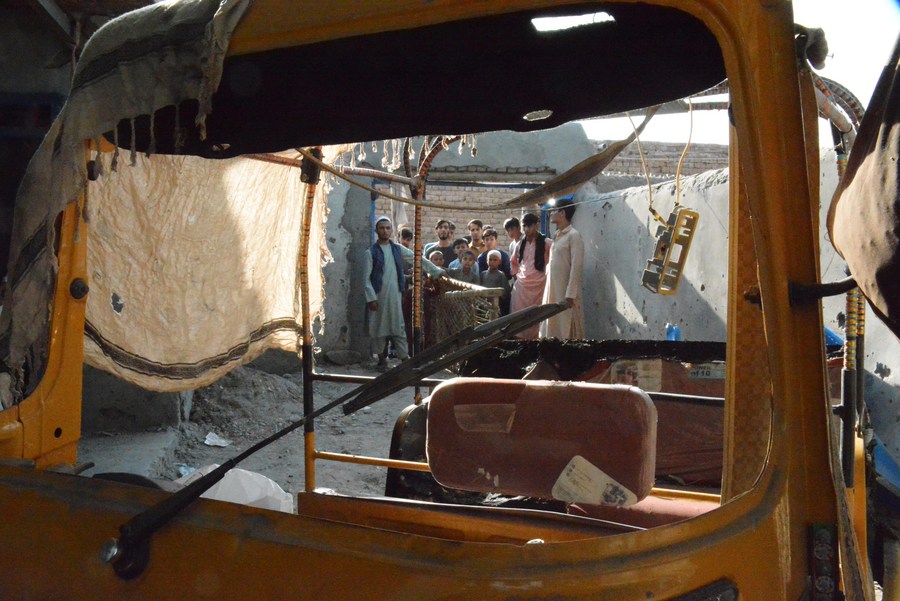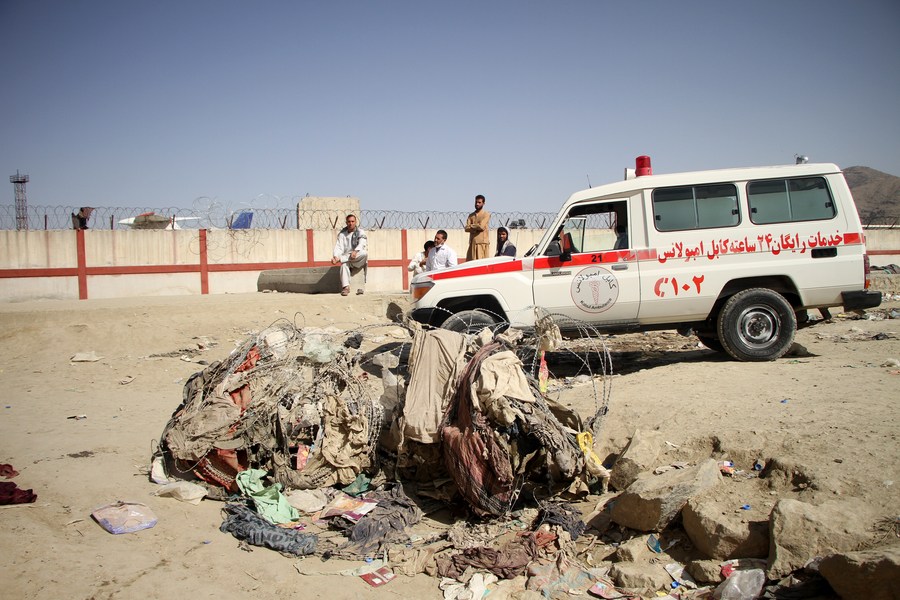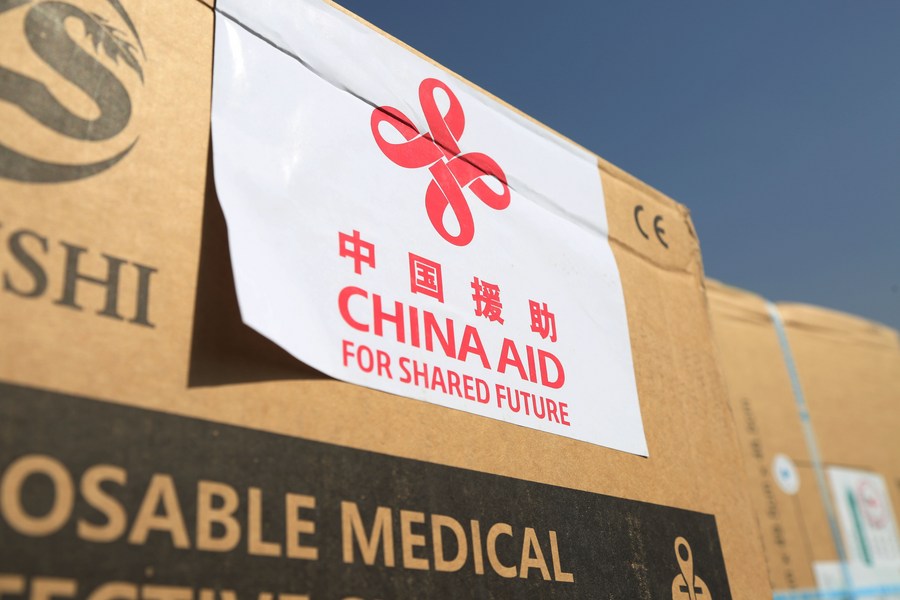Dodging Responsibility Leads to Crisis

In order to fully address a humanitarian crisis, China holds that both the symptoms and the root causes, namely turbulence and poverty, should be addressed and an environment essential to development needs to be created.
More than 3.5 million people find themselves currently displaced from Afghanistan due to the deteriorating security situation in the country, according to UN High Commissioner for Refugees (UNHCR) Filippo Grandi. Significant movements across borders are not yet taking place. The Office of the UNHCR envisages a worst-case scenario of 500,000 Afghan refugees arriving in neighboring countries by the end of the year, seeking a total of $299 million to allow the UNHCR, other UN agencies and partners to pre-position aid and prepare for large outflows of refugees.
Two suicide bombings near Kabul’s airport on August 26 killed over 100 Afghans and wounded many others. Following the blasts, the U.S. military opened fire, leading to more civilian casualties and plunging the country into further chaos. On August 29, U.S. forces based in Afghanistan launched a drone attack officially against a vehicle that was suspected of having links to the so-called “Islamic State” (ISIS) terrorist group and could pose a threat to Kabul airport. Ten civilians were killed, the youngest victim being only 2.
This wasn’t the first time U.S. military actions were responsible for the taking of innocent lives in Afghanistan. In 2002, the U.S. Air Force carried out an airstrike on a wedding in Uruzgan Province, claiming the lives of more than a dozen civilians and injuring over 100. In 2008, U.S. troops attacked a village in Herat Province, killing nearly 100 civilians including about 50 children and 19 women. In 2019, a U.S. drone strike mistakenly killed at least 30 Afghan farmers in Nangarhar Province. A former U.S. soldier and a drone pilot said in a sworn testimony before a UN expert committee that the strikes were purely killing for the sake of killing, and that the U.S. airstrikes led to far more Afghan civilian deaths than the U.S. Government’s official statistics would show.
U.S. troops left Afghanistan in more of a mess than they had found it, resulting in a new humanitarian disaster comparable to the tragedies of both Syria and Iraq.

Lessons to be learned
The U.S. invaded Afghanistan in the name of fighting terrorism and spreading democracy 20 years ago. In August, its forces withdrew from the devastated country without taking any responsibility, and once again only benefiting its own needs. The U.S. even attempted to put the burden on Afghanistan’s neighbors, for example by asking Pakistan to take in more Afghan refugees.
The shambolic exit indicates that the Joe Biden administration has botched the execution. In fact, the U.S. and its Western allies have been failing to protect the Afghan people, let alone those who fled their homes in search of U.S. protection. However, to pass the buck to others is dishonorable, and an oversimplification of how things unraveled.
The human rights of the Afghan people should be defended. The U.S. should provide Afghanistan with the desperately necessary support to serve both the economic and humanitarian needs. They should help the Afghan people overcome their difficulties and embark on a path toward peace and reconstruction at the earliest possible date.
Also, the civilian killings by the U.S. forces that occurred in the past two decades must be thoroughly investigated and those responsible brought to justice, for these are not mistakes, but crimes.
Undoubtedly, wanton military intervention in other countries and the policy of imposing extraneous values, social systems, development models onto other nations are destined to fail.

The past and present of Afghanistan demonstrate that the realization of peace, stability and economic development will be impossible without the establishment of an open and inclusive political structure. Furthermore, it requires the implementation of moderate, prudent foreign and domestic policies plus a clean break with all terrorist groups.
Other countries should genuinely respect the sovereignty, independence and territorial integrity of Afghanistan, as well as the right of the Afghan people to carve out their own future.
The recent attacks in Kabul once again proved that the war in Afghanistan did not achieve the goal of eliminating terrorism. Countries should follow international law and UN Security Council resolutions, and through teamwork resolutely combat international terrorist organizations such as the “East Turkistan Islamic Movement,” ISIS and Al-Qaeda. There must not be any double standards or selective approach.
America in crisis
Recent headlines have put a lot of focus on America’s democracy crisis, its deepening polarization and spiraling inequalities in a political environment driven by demographic change, media fragmentation and electoral gerrymandering. But its declining global power may turn out to be more consequential in the long run.
Following the Cold War, the U.S. enjoyed outsized global influence. Yet as a result of the Iraq War, the financial crisis of 2008 and Donald Trump’s presidency (2017-21), the world no longer places a premium on U.S. power.
A recent survey by the European Council on Foreign Relations found that a majority of Europeans harbor deep doubts about America’s capacity to regain its status as a global leader. Similarly, a majority of people believe that the U.S. political system is broken, and at least 60 percent of the respondents in each country said they can no longer rely on the U.S. to defend them.
Looking back on the chaotic exit from Afghanistan in the future, it may increasingly prove a critical marker of America’s status in a changing world, by far eclipsing the flight from Saigon, Viet Nam, in 1975.

China’s stance
In order to fully address a humanitarian crisis, China holds that both the symptoms and the root causes, namely turbulence and poverty, should be addressed and an environment essential to development needs to be created.
China has been upholding the humanitarian spirit and providing help, within its capacity, to refugee-hosting countries under the UN framework. It is willing to, joined by other members of the international community, calm down global hotspot issues, help refugee-hosting countries improve their ability of dealing with crisis and help the refugees return home.
China’s position on the Afghan issue is clear and consistent. It hopes Afghanistan can form an open, inclusive and broadly based government, uphold moderate and prudent domestic and foreign policies, resolutely combat terrorist forces in all forms, coexist friendly with all countries, and respond to the shared aspirations of the Afghan people and the international community.
Keeping in line with its foreign policy, China respects the will and choice of the Afghan people. China will as always pursue a friendly policy toward the Afghan people, respect Afghanistan’s sovereignty, independence and territorial integrity, and will not interfere in the country’s internal affairs.
Additionally, China believes that a political solution is essential for Afghanistan. It is ready to have a dialogue with the U.S. and push for a soft landing of the Afghan issue, in order to prevent a new civil war or humanitarian disaster and not see the country relapse into a hotbed and shelter for terrorism. It is willing to coordinate with the U.S. on the premise of mutual respect. However, the U.S. cannot, on the one hand, work hard to contain and suppress China, and on the other hand, count on China’s support. This logic has never existed in international relations.
Last but not least, China will continue to maintain close communication and coordination with all parties in Afghanistan and other members of the international community in combating all terrorist groups. It will provide the utmost support and assistance to help Afghanistan restore security, rebuild economy, and integrate into the international community for an early realization of peace and reconstruction.
The author is an op-ed contributor to Beijing Review and an expert on international studies.
 Facebook
Facebook
 Twitter
Twitter
 Linkedin
Linkedin
 Google +
Google +










